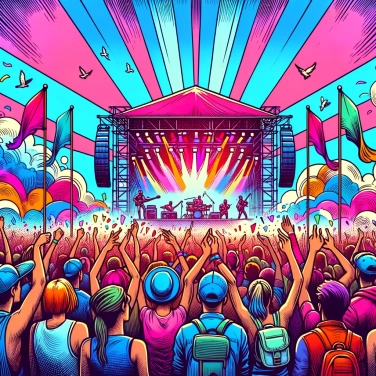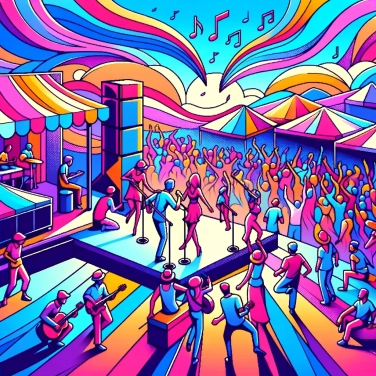Music festivals attract passionate crowds every year because they offer an immersive experience, a space of freedom and conviviality, as well as artistic diversity that caters to the varied tastes of the participants.

When you attend a festival, you experience the show differently than just listening to your playlist at home. There’s the thrill of seeing your favorite artists on stage, right in front of your eyes, with striking light displays, giant screens, and powerful sound that resonates deep within you. Just a few meters away, you feel the raw energy of the musicians, you see their spontaneous reactions, you catch their smiles at fans or their moments of emotion. The audience also adds a living dimension that you can't find anywhere else: singing in unison, clapping in rhythm, moving spontaneously together. All of this is a unique experience that cannot be replaced.
Most festivals know how to attract their audience by offering a rich and diverse artistic selection. They often combine well-known headliners with emerging bands in different styles, ensuring that everyone finds something they enjoy. They also play with balance: between international artists, local talent, and surprising underground gems. In short, whether you prefer pop, rap, electro, or crazy alternative rock, there will always be at least a few performances made for you. This variety encourages exploration, pushes you out of your musical comfort zone, and promises a unique experience each time.
Festivals are not just about the music; they are also a whole vibe where everyone is there to have fun together. You meet thousands of people who have come to let loose, laugh, dance, exchange smiles or high-fives with strangers. This friendly aspect quickly creates a sense of community and reinforces the feeling of belonging. You feel part of something bigger than yourself, a kind of large tribe united around the same musical passion. Colorful costumes, fluorescent bracelets, flags, or personalized signs all contribute to a shared energy and a super warm and festive atmosphere. And no one wants to miss a single second of that vibe!
Festivals are a great way to explore music genres that you might not listen to every day. You might stumble upon a highly talented band from the other side of the world, playing a completely unusual musical style, and leave with new favorite songs. Not to mention the stalls and cultural spaces that give you a glimpse into other traditions and arts from elsewhere. Beyond just listening, you dive into the artistic universe of diverse, often surprising origins, and come away with your musical and cultural horizons broadened.
Attending a music festival means leaving with countless memorable highlights. Singing at the top of your lungs to a legendary song with thousands of strangers, laughing and dancing in pouring rain, or camping in an improvised tent with friends—these are the types of experiences that become unforgettable. The instant sharing of videos and photos on social media is also part of the game: everyone captures their musical favorites and quirky little anecdotes, thus creating an active virtual community. These unique moments strengthen existing friendships and encourage unexpected new encounters. Even after the speakers are turned off and the last encore is played, nostalgic discussions continue for weeks about the shared anecdotes. A real festival is not just an event—it's a memory-making factory.
The world's largest music festival, the Donauinselfest in Vienna, welcomes up to three million visitors each year, offering free concerts and various entertainment over three full days.
According to a British study, regularly attending musical performances and festivals significantly increases feelings of well-being and even extends life expectancy due to reduced stress and increased social connections.
Some famous festivals like Glastonbury in England are not limited to music alone. They also offer theatrical performances, artistic workshops, and even spaces dedicated to wellness and meditation.
During major music festivals, organizers often provide RFID wristbands that allow festival-goers to pay for their purchases without cash and easily locate their friends through a dedicated mobile app.
Yes, many festivals today offer dedicated spaces for families with activities suited for the youngest, as well as a safe and friendly environment where everyone can enjoy the moment.
Check the lineup in advance and focus on the lesser-known acts to discover emerging bands. Also, follow the festivals' social media for recommendations and highlights.
Absolutely! Take regular breaks, stay hydrated, eat a balanced diet, and wear comfortable shoes. Also, remember to set aside quiet moments to better enjoy each concert.
Sure! Here’s the translation: "It depends on the chosen festival and its duration. Consider the cost of tickets, as well as any additional expenses such as transportation, accommodation, food, and souvenirs. It is advisable to check prices in advance on the websites of the relevant events."
Choose carpooling or public transport to get to the event, prefer reusable cups on-site, and follow the waste sorting or collection guidelines. Many festivals today offer zero waste initiatives and raise awareness among festival-goers about ecology.
Make sure to bring enough water, sun protection, weather-appropriate clothing, and practical accessories like earplugs. Also, check the schedule in advance to plan your stay on-site.

No one has answered this quiz yet, be the first!' :-)
Question 1/5